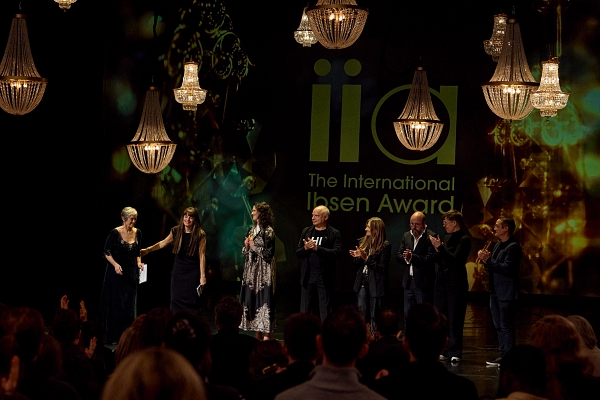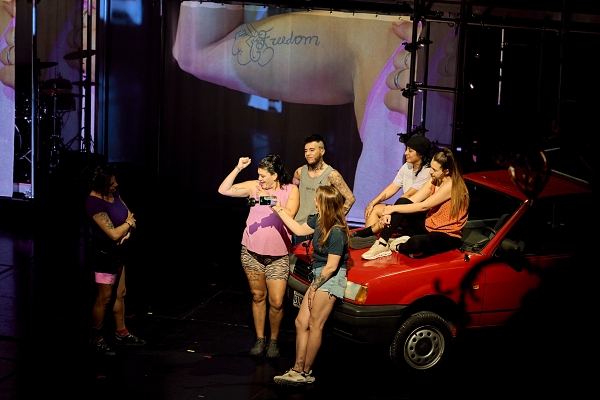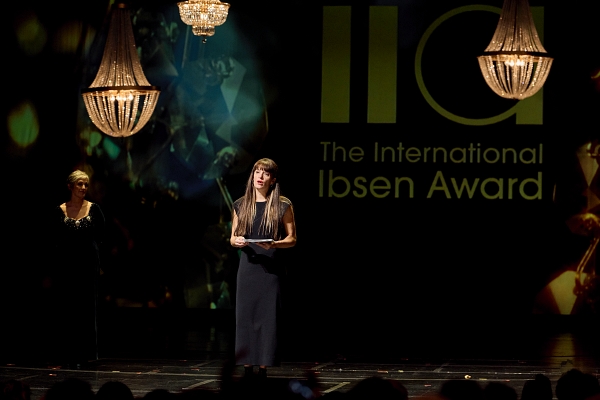Theatre is ‘an echo chamber where we can hear what is difficult to hear in the real world’. Lola Arias
It’s a crisp October day in Oslo for the biannual International Ibsen Awards and the red carpet has been rolled out in front of the grand National Theatret. Just up the street from the recently awarded Nobel Prizes, it was founded by the Norwegian government in 2008 to recognise individuals or organisations that have introduced innovations to the world of theatre. Previous winners include Peter Brook (the first laureate), Peter Handke (also awarded the Nobel Prize in Literature) and most recently the Australian company, Back to Back Theatre.

Winner of this year’s award is Argentinian Lola Arias, a writer, theatre and film director. As a multi- and interdisciplinary artist, Arias has been playing with the intersections of reality and fiction since 2008, in productions which she describes as ‘documentary theatre’. Exploring the worlds of marginalised or forgotten voices, it has been more specifically described as ‘post traumatic theatre’ for the people she has brought together have all experienced profound trauma.
Previous productions include ‘Minefield’ (Royal Court Theatre 2016) which brought together war veterans from both sides of the Falklands War, ‘My Life After’ (2009) where six performers reenact their parents’ ordeals during Argentina’s dictatorship, ‘Futureland’ (2019) a science-fiction documentary piece about unaccompanied teenage migrants in Germany and her latest theatrical work, ‘Days out there’ which explores the lives of ex-prisoners from Buenos Aires.
Receiving her award from Even Aleksander Hagen, the State secretary for the Norwegian Ministry of Culture and Equality, Arias seemed humbled yet fearless; determined to share her award with all the producers and protagonists of her 25-year career:
Thank you to the jury for shining a light on a woman from Argentina at a time when Javier Milei's far-right government is bent on destroying education, public health, national industry, art, and cultural institutions, and pushing thousands of people to live below the poverty line.‘ Lola Arias
It was after running theatre workshops in the Ezeiza prison in Buenos Aires 2019 that Lola Arias decided first to make a film about life inside prison followed by ‘Days out There’ which is currently playing at the Oslo National Theatre during a European Tour. Arias is evidently unafraid of transformation, working boldly in the spaces between forms and genres. ‘Days out there’ is a musical (yes, a musical with a lot of dancing) about a group of six cis women and trans people, recently released from various prisons in Argentina, learning to live on the outside again. Except these individuals are actually learning a whole lot more than that because what is unique in Arias’ approach is that the protagonists, with no professional experience, are on stage performing themselves (bar one who has been covered for the tour). The political, ethical and practical ramifications of this are complex and Arias has spent years making this happen.

It's no accident that Arias has chosen to pursue this marginalised group when the number of women in Buenos Aires prisons have doubled in the last five years, most being imprisoned for drug trafficking. Although there are well-established charities in the UK arguably producing this kind of work with prisoners or ex-prisoners for Lola Arias the ‘artistic concept’ and the urge to pursue urgent stories seems to come before the practical and ethical considerations which her team respond to ‘organically’. When it came to producing and then touring this show, she inevitably ended up requiring the assistance of lawyers, psychiatrists, therapists and more. It’s no surprise that she describes pulling this work off with the most ‘vulnerable’ individuals she has ever worked with as her greatest challenge yet. Yet here they are, on the front row of the award ceremony, performing every night and by the looks of things, embracing this new world.
The six individual stories told to Arias during the lengthy rehearsal process have been woven together with original songs and dance. Their lives are all as tough as you’d expect; growing up with parental addiction, surrounded by poverty and violence, earning money through sex work or drugs or illegal sweatshops. Yoseli was held up at Ezeiza airport on her way to Europe for a job she’d been promised in Barcelona, with two kilograms of cocaine in her suitcase. Noelia has been a sex worker since she was thirteen and tells the story of her (visibly) missing teeth when a punter smashed her head against the dashboard of his car. It is she, not her attacker who is arrested when the police are called. Transforming these ‘real’ often harrowing stories into a script and then a show has at times been a battle for Arias both creatively and personally.
‘As I moved from fiction to non-fiction, many people told me what I was doing was not theatre.’ Lola Arias
But live theatre (unlike film) is a form where real life inevitably interrupts fiction, whether that’s the noisy audience member on the seat behind you or the current political climate which transforms a classic play. By literally bringing her subjects onto the stage, 'documentary theatre' raises glaring questions about ownership and agency asking who owns these stories and who has a right to be on stage, as well as encouraging audiences to engage in social and political realities whilst they enjoy a night out.
Above all it should be said Arias's theatre is uplifting, not despondent, largely because of the care that has been taken to hear the authentic voices of each human story, full of both joy and pain. Finding light in the darkest places, Arias continues to celebrate the power of art as spaces for ‘conversation’ and expressions of hope. Let us hope that receiving the prestigious International Ibsen Award inspires her to continue creating challenging and innovative theatre for years to come.
‘All my plays reconstruct the past, but they’re really asking about the future. Being able to imagine the future is a privilege for those who don’t have the challenge of surviving every day. Perhaps these plays are an attempt to imagine possible futures. ‘ Lola Arias

Photo credit: Rikke Løe Hovdal



